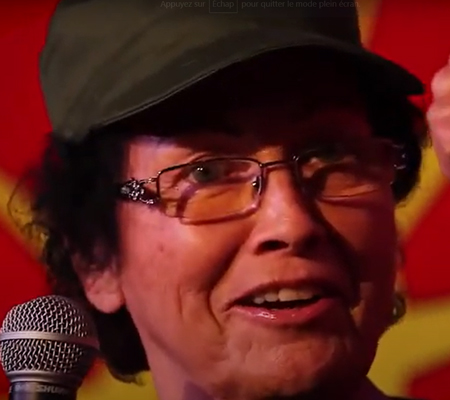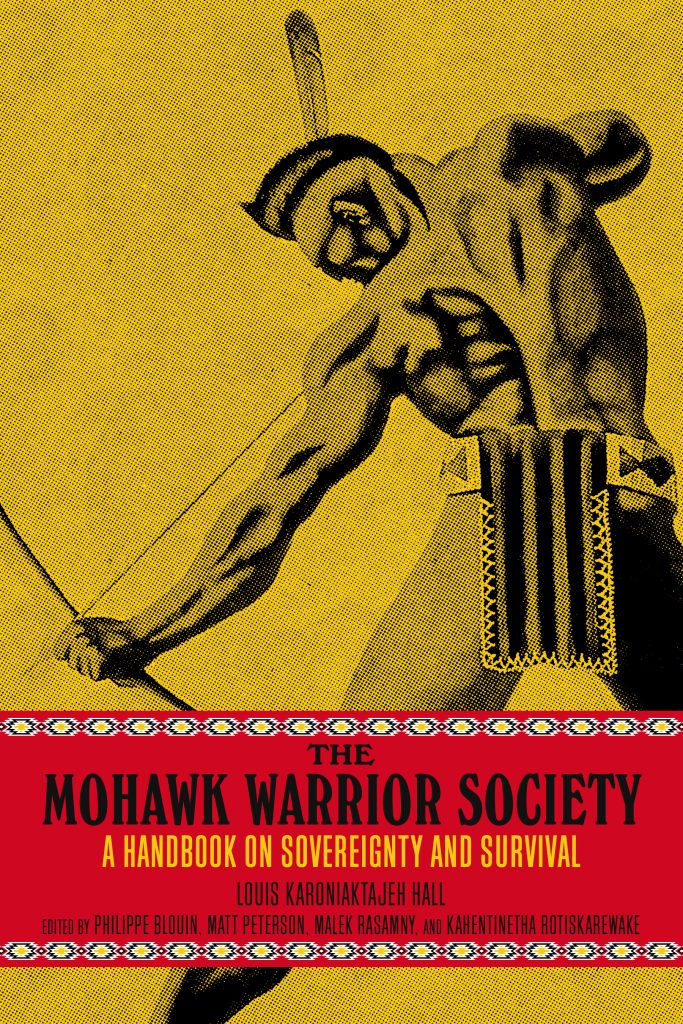
Kahentinetha Rotiskarewake is a Kanien’kehá:ka from the Bear Clan in
Kahnawà:ke. Initially working in the fashion industry, Kahentinetha went
on to play a key role as speaker and writer in the Indigenous resistance, a
role which she has fulfilled consistently for the last six decades. During
this time, she witnessed and took part in numerous struggles, including
the blockade of the Akwesasne border crossing in 1968. She has published
several books, including Mohawk Warrior Three: The Trial of Lasagna, Noriega
& 20–20,1 and has been in charge of running the Mohawk Nation News
service since the Oka Crisis in 1990. She now cares for her twenty children,
grandchildren and great-grandchildren. Kahentinetha means she who is
always at the forefront.
The Mohawk Warrior Society: A Handbook on Sovereignty and Survival
SKU: 9781629639413
Editors: Louis Karoniaktajeh Hall • Edited by Kahentinetha Rotiskarewake, Philippe Blouin, Matt Peterson, and Malek Rasamny
Series: PM Press
ISBN: 9781629639413
Published: 11/22/22
Format: Paperback
Size: 6×9
Pages: 368
Subjects: SOCIAL SCIENCE / Native American Studies • HISTORY / Indigenous Peoples of the Americas • POLITICAL SCIENCE / Colonialism & Post-Colonialism
Praise
“While many have heard of AIM & the Red Power movement of the ’60s and ’70s, most probably do not know the story of the Mohawk warriors and their influence on Indigenous struggles for land and self-determination, then and now. These include the 1974 Ganienkeh land reclamation (which still exists today as sovereign Mohawk territory), the 1990 Oka Crisis (an armed standoff that revived the fighting spirit & warrior culture of Indigenous peoples across North America), and the Warrior/Warrior Unity flag, a powerful symbol of Indigenous resistance today commonly seen at blockades & rallies. The Mohawk Warrior Society: Auto-History of the Rotisken’rhakéhte tells this history in the words of the Mohawks themselves. Comprised of interviews with some of the key participants, as well as The Warrior’s Handbook and Rebuilding the Iroquois Confederacy (both written by Louis Karoniaktajeh Hall, who also designed the Warrior/Unity flag), this book documents the important contributions Mohawk warriors have made to modern Indigenous resistance in North America.”
—Gord Hill, Kwakwaka’wakw, author of 500 Years of Indigenous Resistance and The Antifa Comic Book
“This clear and stimulating book had me on edge from beginning to end. No matter who we are we can learn from these histories of the Iroquois Confederacy as related by its present-day members, lessons pertaining to nonhierarchical political organization and the care of the land. In the age of Black Lives Matter this work makes the case for autonomous life-spaces free of US or Canadian state control.”
—Michael Taussig, Class of 1933 Professor of Anthropology, Columbia University
“This book is a window into a world seldom glimpsed by Europeans and their settler descendants. Revealed to us is the inner vision of First Nation liberation movements that emerged from forms of government within which group autonomy and individual freedom have been cherished for thousands of years. Despite inspiring the US Constitution, these confederacies were heavily repressed and forced underground. At the end of the 1960s, the Warrior Society was rekindled by seven original members who vowed to defend their people against state violence depriving them of their rights. Overnight, they were joined by hundreds throughout Mohawk lands, then thousands all over the Iroquois Confederacy, with supporters from the East Coast to the West Coast in North and South America. The Warrior Society emerged within a broader cultural renaissance that imbued traditional matrilineal cultures with new vitality. As part of the global awakening of the 1960s, they were more popularly rooted than AIM or the Black Panthers. Their Great Law provides an ecological and democratic framework for peaceful coexistence of all peoples.”
—George Katsiaficas, author of The Subversion of Politics and The Global Imagination of 1968
“This book takes the reader behind the masks of the Mohawk Warrior Society, exploring the deep roots of the controversial Indigenous movement that precipitated the 78-day standoff at Oka in 1990. Offering unprecedented oral histories, concept glossaries, and transcripts of internal documents, this auto-history presents the perspective of the Rotisken’rhakéte in their own words. All readers interested in contemporary Indigenous resistance to colonialism will find much of value in this unique compendium that goes beyond the well-known symbols to explain their origins and meaning.”
—Jon Parmenter, associate professor of history at Cornell University and author of The Edge of the Woods: Iroquoia, 1534–1701
“The Mohawk Warrior Society is an excellent collection of stories about colonialism and resistance in Turtle Island—a must read for settler allies seeking to learn and unlearn the histories of colonial violence that structure our contemporary relations. In providing vital histories of state repression and Indigenous resilience, the teachings in this volume can inform all contemporary efforts working towards decolonialization.”
—Jeffrey Monaghan, Criminology and Criminal Justice, Carleton University, coauthor of Policing Indigenous Movements
“I’ve been blessed because I came to know the Unity Flag by seeing Oka on TV when I was young. When I got married they wrapped us with the flag, it has been a part of all the spiritual ceremonies that I went to, it has been present at every blockade. Along with the Women’s Warrior Flag, it’s a symbol that’s embedded in our spirit, and it’s always been an inspiration. Louis Hall, Ganienkeh, and The Warrior’s Handbook were way ahead of their time, back when people were just starting to fight back, fighting to get their land back. The intention of The Warrior’s Handbook and Unity Flag was for all Indigenous nations throughout the hemisphere and really the whole world to unite, and first and foremost to fight. That’s why this book is so important, it’s something that Louis Hall has gifted to all red nations.”
—Kanahus Freedom Manuel, Indigenous land defender, Secwepemc Women Warrior Society, Tiny House Warriors“This is a compelling account of the political struggle for the return of indigenous thought through the words of those Kaianerehkó:wa Mohawks affiliated with the original 1970s Warrior Society. It offers a trenchant and witty critique of settler colonialism together with a body of teachings aimed at re-establishing balance and harmony. It is for the Kanien’kehá:ka, the indigenous peoples of Turtle Island, and all people troubled by the state of our relations to each other and to the beings of the land that make us as well as those who care for it.”
—Eduardo Kohn, associate professor of anthropology at McGill University and author of How Forests Think
Book Events
may, 2024
No Events

